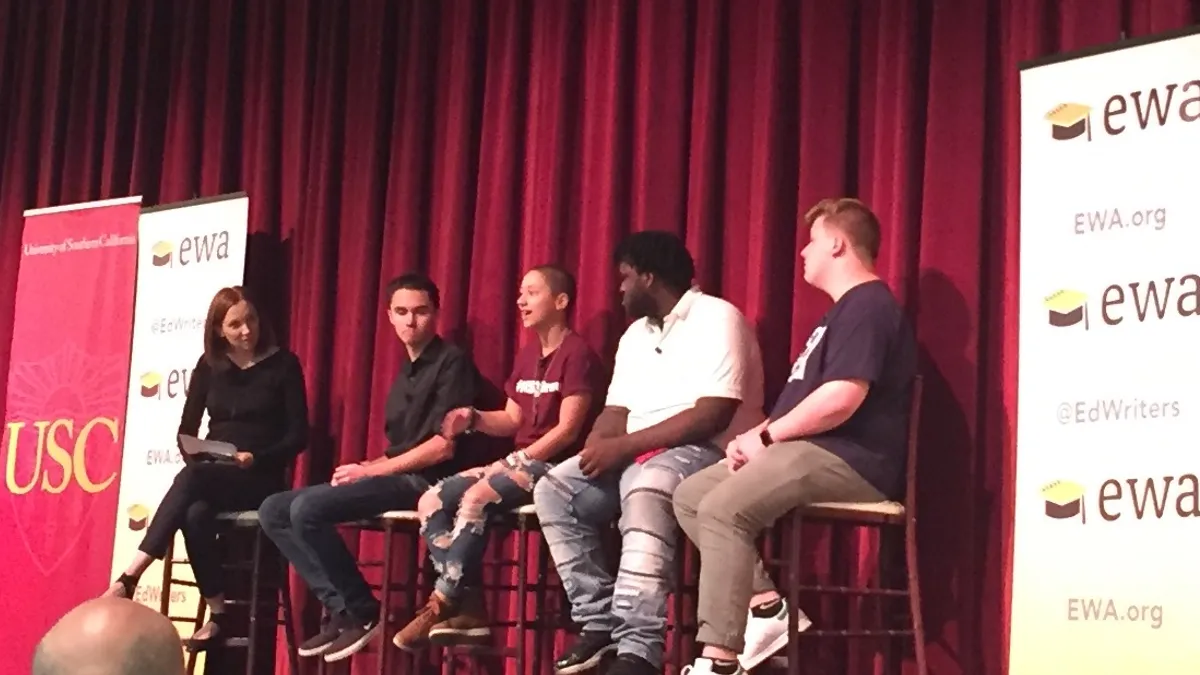David Hogg, Emma Gonzalez and other March for Our Lives organizers will continue their campaign against gun violence this summer when they travel to communities across the country to meet with “young people who need to have their voices heard,” Gonzalez told attendees Thursday at the Education Writers Association’s annual conference, held at the University of Southern California in Los Angeles.
Speaking on a panel about student activism, Gonzalez joined fellow Marjory Stoneman Douglas High school senior David Hogg, Alex King of North Lawndale College Prep High School in Chicago and Jackson Mittleman of Newtown (Conn.) High School to share how they have been affected by shootings in their schools and communities, and how they are trying to sustain the nation’s focus on gun control.
“It’s a universal conversation,” Gonzalez said. “Adults were looking at this in a single-faceted way. If you don’t address the whole problem, it’s never going to be solved. It’s not just schools. If you just address schools, Las Vegas is still going to happen. So is Charleston.”
The students’ first goal is to get as many high school students to register to vote on May 29, Hogg said. Then on June 15, they’ll have an event in Chicago, where King said the focus will be on trauma-informed education.
“It is statistically proven that one exposure to a traumatic event actually affects brain development,” King said, adding that he wants to see more attention to how the violence students experience outside of school affects learning. In Chicago, he added, “we don’t have school shootings, we have daily shootings.”
Making sure ‘nobody would forget’
Hogg said when the shooting at his Parkland, Fla., school began, he first thought it was a drill because the school had been planning one. But he began recording videos with his phone in case it was real and “hoping our voices would carry on even if our souls wouldn’t,” he said.
He also continued to engage with the media because his sister lost four of her friends. “I felt a sense of responsibility for my sister,” he said. “I wanted to make sure that nobody would forget about this.”
Citing statistics about the costs of gun violence and political arguments on both sides of the spectrum, Hogg said he would like to see more “violence interruption” programs such as the Positive Peace Warrior Network, the Chicago program in which King participates. King, whose nephew was shot and killed last year, was among the students who former Secretary of Education Arne Duncan took to Florida to meet at Gonzalez’s home.
In addition to experiencing his first time on a plane, and thinking Gonzalez’s home was a hotel, he said he was impacted by seeing “so many parents, so many children” at the Parkland school.
He joined the Peace Warrior program, in which members meet with and provide support to students who have lost family members to gun violence, because he wanted one of their t-shirts. “I was also told there was going to be free food,” he said about meeting with counselors about the program.
He has also learned that he is a leader and that his voice matters, he said.
“If I can get on board, I can get a lot more people to get on board,” he said. “I didn’t plan the walkout, and for some reason, I end up being the leader of the walkout.”
‘Changed forever’
The current activism of students such as Hogg and Gonzalez has given students who lived through the 2012 shooting at Sandy Hook School in Newtown, Conn., a chance to articulate what they’ve been feeling for more than five years, Mittleman said.
“Newtown is so changed forever, and we don’t want to be defined by this tragedy. I don’t want to have a tattoo of tragedy and sadness,” he said, adding that there are “so many who emotionally can’t take what happened. They all struggle with this, and you need to find the right time to talk about it.”
The students on the panel also responded to questions about their confidence before crowds, their grasp of controversial issues, and the articulate way they present their cases. Hogg responded that what students are saying isn’t new, but that now adults are paying attention.
“People sent us to high school so we could learn stuff,” Gonzalez said, “and they’re amazed we paid attention.”















